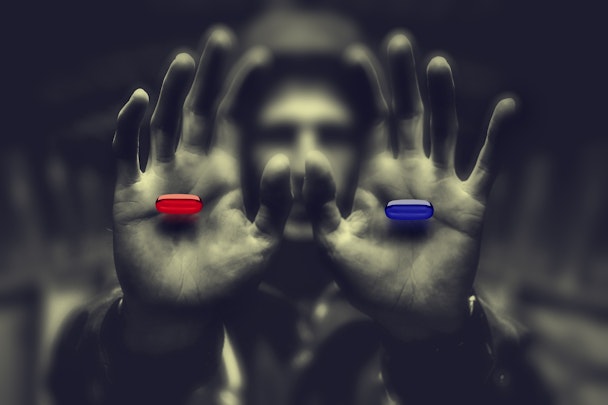The metaverse red pill: how we can avoid creating Earth 2.0
The term ‘red pill’ has been co-opted by conspiracy theorists, but it was born in The Matrix as a choice to discover the universe’s limitless opportunity (and, as internet trolls forget, a metaphor for the transgender experience). For our metaverse deep dive, Chris Edwards of creative agency Tommy reclaims the term, arguing we face a choice between recreating humdrum analog experiences and creating fantastic new worlds.

It’s time to take the red pill on the metaverse / Septimiu via Pixabay
As you read this, creative directors are being asked for ideas for something few of them will have experienced and many don’t really understand. That’s not a slight on them, but the metaverse is a phenomenon that we’re feeling our way into – even those of us who spend a disproportionate amount of time thinking about digital experiences.
So far, brands are replicating real-world activities (sometimes badly). Is that it though? Making what we already do virtual? Surely not. The full opportunities of the metaverse are yet to be revealed.
A new party with the same guests
There’s a problem with people operating in existing societies, with existing ideas and experiences, being invited to enter new worlds – they can’t help but bring at least some of their ‘old world’ to the party. Given most of us are not game designers or fantasy writers, with the chance to throw off all shackles of convention, we start with what we know. We work within implicit barriers.
That’s what brands are doing in the metaverse. Almost anything is possible and we’re running virtual sales promotions (buy a Spiderman ticket and get a free NFT), creating luxury handbags for the metaverse elite, and releasing limited-edition trainers that sell out in six minutes.
This isn’t a lack of imagination. It reflects real-world restrictions on investment and creativity. How do you explain to your board that you’re going to sell a solar-powered flying car in the metaverse? Especially if it’s at a crypto pocket-money price to engage a new audience of eco-conscious avatars in motor vehicle ownership. You’ll probably get a sign-off on a virtual test drive of something you currently manufacture.
Without getting too philosophical, I wonder what chance this decentralized alternate reality has of being different. Will it end up reinforcing the same ideas and mechanisms that we have in society – those that create inequality, competition and monopolization? Or could it be a place where fantastical ideas flourish, and where the restrictions of embedded structures such as money (and the natural laws that govern our universe) are banished?
The metaverse for brands and agencies
This matters for brands because the question of what the new frontiers are is key. Can they experiment in ways that genuinely add value for customers (not just opportunities to buy expensive bags they now can’t afford in two universes)?
Things in the metaverse rely on an active community to thrive. Won’t these communities revolt if they’re served the same solutions (and problems) that they face IRL?
Agencies will play a key role in answering these questions. Understandably, brands will expect them to create exceptional experiences. There’s a familiar path of using platforms such as Roblox as an ‘ideal starting point,’ giving both client and agency parameters and respected organizations to emulate.
Beyond these toe-in-the-water tests, will they be able to quickly grasp the multitude of options available?
One deciding factor will be the startups currently being snapped up by bigger brands, such as Nike and RTFKT. As they get bought up, will they conform, or help their acquirers to push the boundaries?
Gray matter matters
Where will this gray matter work get its inspiration? Stock markets or Star Trek? The term metaverse is attributed to science fiction writer Neal Stephenson – does that give us a clue?
We need to listen to both markets and stories. In a world where anything is possible, we shouldn’t go back to what we already do. We should try and imagine what could be and embrace childlike fantasies of worlds where no one tells us what does and doesn’t work. Equally, brands will enter the metaverse as a business opportunity and market forces will ultimately shape what happens.
Like all good innovation, the best ideas will come from what’s missing, from what can be improved, and from thinking about the ‘what if?’ It will come from working out what the people who inhabit it want by observing, fantasizing and testing (without the middle bit you end up with ‘faster horses’).
It’s exciting. Get it right and you can engage new audiences beyond your reach in the real world, you can build products that no one ever got on to a production line, you can live next door to Snoop Dogg if you want. So what will you do?
Red pill: science fiction, utopian worlds, fantasy creative ideas, endless innovation.
Blue pill: virtual grocery shopping.
Content by The Drum Network member:

Tommy
Tommy are a Global Creative & Production Studio who stand out in the sea of sameness to deliver work that is truly distinctive. Ideas that are different. New. Evoke...
Find out more
